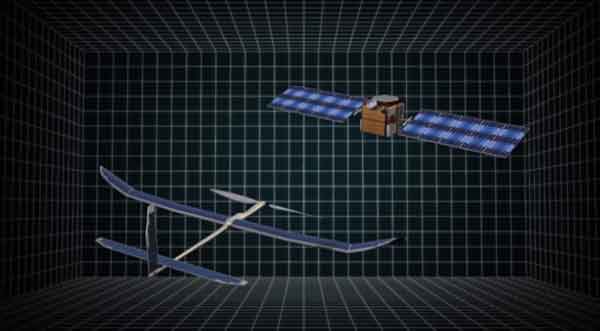
Can a solar-powered drone bring Internet access to the globe? Based on reports, Facebook may be prepared to pay $60 million for Titan Aerospace’s unmanned aerial vehicles. Credit: TomoNews US on YouTube.
If reports of Titan Aerospace’s acquisition by Facebook are true, the solar-powered drone company is about to acquire 60 million new friends.
Techcrunch reports that the estimated $60-million deal would provide Internet (and Facebook) access to the five billion people on the planet without it and produce 11,000 Titan Solara 60s—unmanned aerial vehicles built to store enough solar energy to fly for five years without the need to refuel.
The Solara 60 boasts close to 3,000 solar cells on its upper wing and tail surfaces that can generate seven kilowatts of power during daytime, and lithium-ion batteries that propel its 60-foot wingspan and 100-kg payload capacity at night, says Gizmag. And unlike many highway drivers, the 160-kg Solara cruises at 65 mph.
Though the drones weren’t necessarily designed to provide email and social networking access to third-world countries (other applications include “weather monitoring, disaster recovery, and Earth imaging”), they do seem to be an integral part of Facebook’s long-term plans to not only expand their audience and bottom line, but also do a little good.
Connecting the most remote parts of the globe is the goal of Facebook CEO Mark Zuckerberg’s pet project, Internet.org. The organization, which also has the support of founding members Ericsson, MediaTek, Nokia, Opera, Qualcomm, and Samsung, seeks to make Internet access more affordable, an objective that starts with the production of “lower-cost, higher-quality smartphones”—and, with this apparent and impending acquisition, some super cool, solar-powered drones.
Never one to be outdone, Google has their own initiative, Project Loon, aimed at providing balloon-powered Internet to the world.
Check out the video of the Solara 60 above and decide for yourself whether drones or balloons will better serve the disconnected world.
Feature Image Credit: TomoNews US on YouTube
